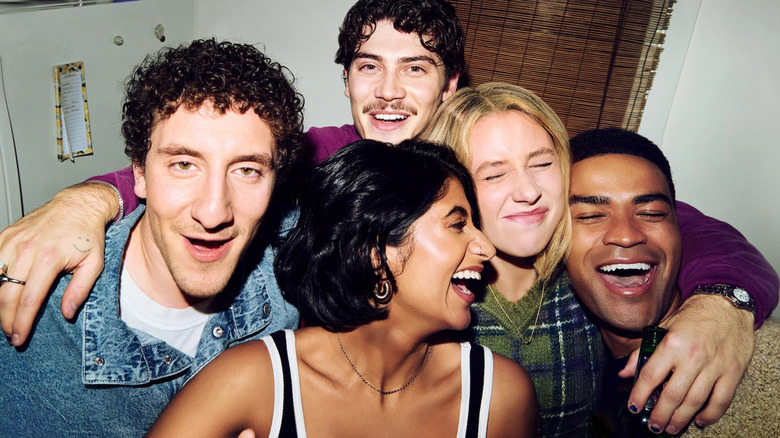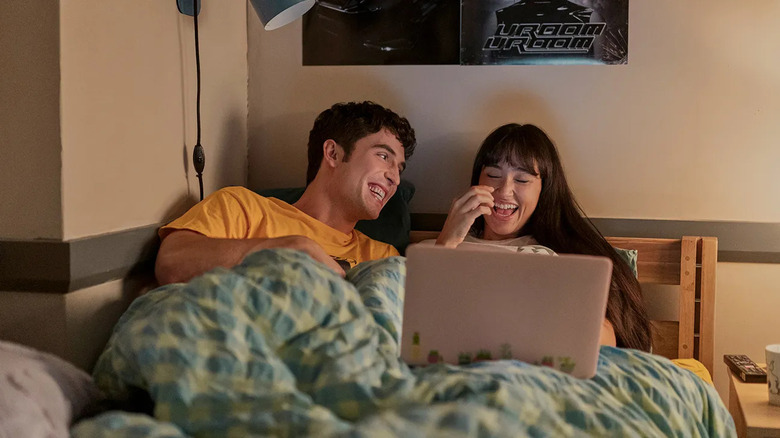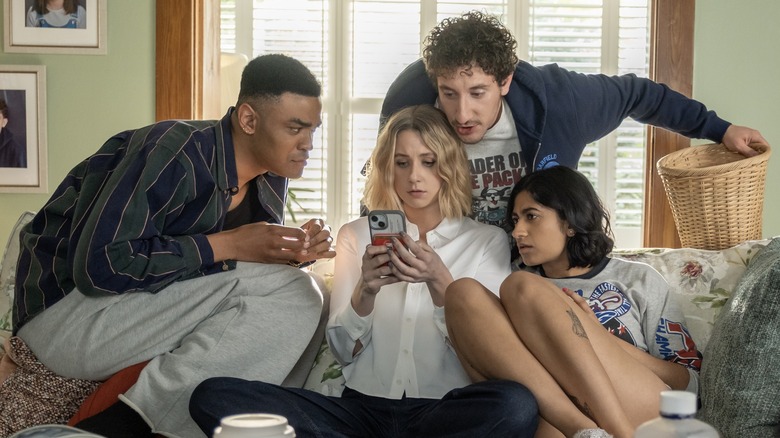Every Streaming Service Wants Τhe Next Friends, But Streaming Was Built To Kill The Next Friends
In the early 1990s, the hangout sitcom exploded in popularity as Americans collectively agreed that watching attractive, witty 20-somethings whine about their daily frustrations while loitering in their friends' kitchens or sharing a cup of coffee at the local spot was the best way to decompress after a long day. Shows like "Living Single," "Seinfeld," and "Friends" weren't workplace comedies, dramatic procedurals, or focused on the family; they were shows about people hanging out and proved that relatable, observational humor could be found in mundane situations like moving a couch up an apartment building stairwell or trying to find a car in a parking garage.
The style gained momentum in the 1980s, thanks to the success of "Cheers," but it was "Friends" that truly broke the mold as increasingly disillusioned Gen Xers entered adulthood, coinciding with TV networks' desperate search for "watch with dinner" programming. If sitcoms were slashers, "Cheers" would be 1974's "The Texas Chain Saw Massacre," 1993's "Living Single" would be 1974's "Black Christmas," and "Friends" would be John Carpenter's formula-defining "Halloween." And just as "Halloween" launched countless films trying to capture the film's popularity, studios, streamers, networks, and corporations have all been desperately trying to find the next "Friends."
Before streaming completely changed the way audiences consumed entertainment, there were plenty of popular hangout shows — "How I Met Your Mother," "The Big Bang Theory," "New Girl," "Girlfriends," and "Happy Endings" among them — that carried the torch forward. But in the streaming era, finding the next great "hangout sitcom" has been seemingly impossible. Is it because the monoculture is dead? Is it because hanging out now includes scrolling on phones and panicking about the 24-hour news cycle? Is it because people just don't hang out in real life anymore?
No. It's because streaming does not incentivize growth and its structure, by design, will always kill the next "Friends" before it even has a chance.
The curious case of Overcompensating and Adults
Recently, Prime Video and A24 unleashed the eight-episode first season of Benito Skinner's "Overcompensating," while Hulu dropped all eight episodes of "Adults," with FX releasing each episode weekly in a hybrid model. Created by Rebecca Shaw and Ben Kronengold (who went viral for their hilarious Yale commencement speech), "Adults" was quickly compared to the messy greatness of HBO's "Girls," and the show lovingly attempts to acknowledge this inescapable comparison while boldly establishing its unmistakably Gen Z voice. "Overcompensating," meanwhile, is a college-set comedy straddling the lines of Millennial and Gen Z humor, but adopts the friends-as-chosen-family model with low-stakes relatability and a validation of the inherent anxiety plaguing everyone who entered adulthood after the Great Recession. Both shows boast more diverse casts, openly tackle queer themes, have raunchier senses of humor without the necessary censorship of network TV, are more socially conscious than the sitcoms that came before, and have dynamite ensemble casts.
Neither show is attempting to be the next "Friends," but both shows were created by people who have never consciously known a world where "Friends" wasn't in the zeitgeist. The New York Times even declared "Adults" as "Friends" for a new generation — a great honor, but one that unfairly puts the show on a pedestal it never asked for, not unlike that time Newsweek declared M. Night Shyamalan "the next Spielberg." With only eight episodes from each show available to stream, there's still no word yet on whether or not either series will be renewed for a season 2, which is deeply upsetting.
Neither show's debut season was perfect, but each showed massive promise and ended on enticing cliffhangers that have me craving more. 20 years ago, these would be guaranteed hits that we'd all be describing like "Friends" as, "Wow, they really found their track around season 2 or 3." But in the age of streaming, if you're not perfect at the jump, you might as well be dead in the water — and that's just not how TV works.
The 'Seinfeld Boost' is dead
Unlike film, television storytelling is ever-evolving. Characters grow throughout multiple episodes and multiple seasons, audience feedback influences shifts in the focus of the show, and time allows writers' rooms to settle into a groove. The first season of most television shows is rocky and doesn't accurately reflect how the series is remembered later down the line. "Parks and Recreation," "Buffy the Vampire Slayer," and yes, even "Friends," have pretty "meh" first seasons. But rather than abandon the show after one season, broadcasters wisely kept the shows on the air and allowed them the space to figure themselves out. "Friends" star Lisa Kudrow has even admitted that the fact that the show aired after "Seinfeld" was a huge help in getting audience eyes onto the show, something that straight up does not exist on a streaming platform.
When a show ends on streaming, you might get a recommendation during end credits to try something else, or the dreaded auto-play will kick in, but that's not the same as a timed release schedule with limited, alternative options for what to watch next. The freedom of choice often means people exit out of that screen and watch what they had planned on watching, rewatch something they already know they love, or direct their attention back to their phones. Unless two shows are being unnecessarily pitted against one another — like what we're seeing with "Overcompensating" and "Adults" — shows can seldom help one another out like "Seinfeld" did with "Friends."
In a just world, both shows would be renewed by now. Benito Skinner, Wally Baram, Mary Beth Barone, and Rish Shah would become household names, fans would be debating who in their friend group "is the Paul Baker," and everyone would be theorizing how Owen Thiele — who is on both shows — would juggle his filming schedule. Instead, we're going to have to wait as bean counters who only care about "constant growth rates" and fundamentally do not understand what makes great streaming TV determine the future of both shows, only for the cycle to repeat in a year when they decide once more: "We gotta find the next 'Friends.'"
"Overcompensating" is available to stream on Prime Video, and "Adults" is on "Hulu" and FX.


